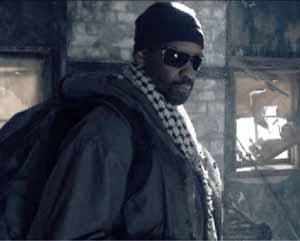 Since the birth of civilization, humans have been preoccupied with its end. In the history of apocalypse stories (and in most cases lately, post-apocalypse), the latest film from the director brothers Hughes (Menace II Society, From Hell) draws from many classic tales of the end of times, resulting in a wholly (holy?) mediocre addition to the pantheon.
Since the birth of civilization, humans have been preoccupied with its end. In the history of apocalypse stories (and in most cases lately, post-apocalypse), the latest film from the director brothers Hughes (Menace II Society, From Hell) draws from many classic tales of the end of times, resulting in a wholly (holy?) mediocre addition to the pantheon.
The Book of Eli, set some 30 years after a nuclear war lit up the skies, follows Eli (Washington) as a lone wanderer across the wasteland. As one of the few survivors of the war, Eli is considered an old man, one whose silence is supposed to be construed as wisdom. Despite his relative old age, Eli is a one-man killing machine, righteously fighting evil with a two-foot saber. You see, Eli carries around a mysterious book (guess which one!) which he reads religiously (eh?). He’s the archetypical pious warrior. He doesn’t want to kill, he’s just pushed to. Every day.
Gary Oldman plays Carnegie, the warlord/dictator of a small, lawless town. Carnegie sends his illiterate cronies to search the land, killing all they cross, for a very specific book that Carnegie desires. This book, Carnegie claims, is a weapon, one he can use to inspire and control the weaklings he already rules.
Once the two old fogies meet, the ensuing pursuit across the barren landscape feels surprisingly small scale. The film was shot mostly in New Mexico, and looks it, with few other locales or destroyed vistas that could add a much needed apocalyptic scope. The frequent low shots of characters standing against impossibly fast-moving digitally inserted clouds also seem to contradict the supposed scarcity of a certain building block of life. So many clouds, so little rain.
And I haven’t even mentioned the themes yet (slight spoilers ahead). Amidst spurts of gruesome violence and out of place look-what-we-can-do virtuoso tracking shots, there’s a muddled message about faith, specifically (if you haven’t guessed by now) Christian faith. The problem isn’t in the message itself but instead in the Hughes Bros. lack of commitment to that singular message. Through an improbable twist, we’re lead to believe that Eli’s badassery stems from his faith in the words within his good book, but this is directly contradicted by another last minute revelation which implies that any words, from any book, hold the same power, a belief I’m sure won’t sit well with devout subscribers of any religion.
With such inconsistencies, it’s a shame that the supporting cast doesn’t much make up for these shortcomings. Mila Kunis is the annoying cub to Washington’s reluctant Lone Wolf. Tom Waits shows up briefly as a squirrelly shop owner. Michael Gambon’s (Dumbledore) role as a foul-mouthed old coot is short lived. And sadly, Oldman’s villain is a lesser version of the eccentric classics he’s played in the past. Unfortunately, The Book of Eli is a sometimes exciting, sometimes infuriating, often boring film of poorly executed, half-formed ideas.














I’m not going to give it away, but there’s a final plot twist in this movie that is beyond absurd.
Comment February 5, 2010 @ 3:45 am